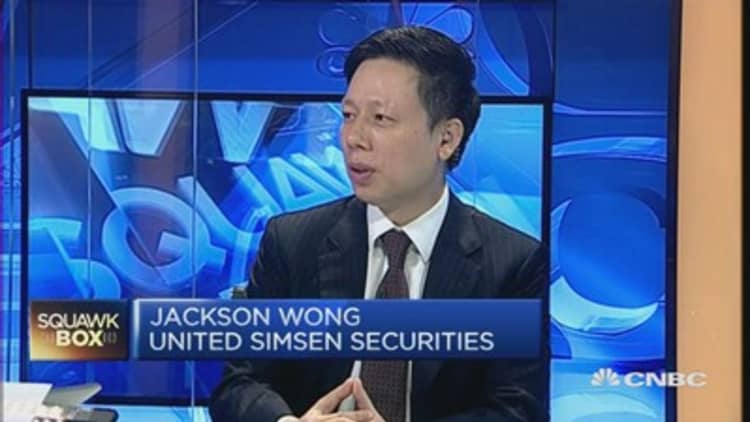Asian equities mostly advanced on Monday after Greek Prime Minister Alexis Tsipras made a new offer of reforms over the weekend.
The euro and U.S. stock futures also firmed up on the back of signs of a compromise in the stalled debt talks, as the cash-strapped Greece and its foreign creditors prepare to continue negotiations at a crisis summit in Brussels this week, after an unfruitful Eurogroup meeting last Thursday and as anxious depositors pulled billions of euros out of Greek banks.
"S&P futures have opened on a stronger note... So far, we have heard constructive narrative of a new Greek proposal, with a number of new measures being effectively leaked through various newswires. We have even heard from the French camp that the proposal may form the basis of an agreement which the euro zone finance ministers can accept and use in the upcoming head of state summit," IG's chief market strategist Chris Weston wrote in a note.
On Friday, Wall Street finished lower, with major indices ending near their lows of the day. The blue-chip and S&P 500 dropped 0.55 and 0.53 percent, respectively, while the Nasdaq Composite shed 0.31 percent following a record high in the previous session.
Nikkei soars 1.3%
Japan's benchmark Nikkei 225 finished at its highest level since June 8.
Banking shares were among the day's top performers, with Mitsubishi UFJ Financial Group and Sumitomo Mitsui Financial Group soaring 3.4 and 2.7 percent, respectively.
Honda Motor is in focus after the company's U.S. unit said Friday it has linked the death of a woman in Los Angeles last September to the rupture of a Takata airbag inflator, bringing the number of fatalities related to the defective airbags to eight.
Shares of the carmaker closed up 2.2 percent, while Takata sagged 0.4 percent.
Read MoreAsia's week ahead:All eyes on Greece
Kospi gains 0.4%
South Korea's key Kospi index extended gains into a four-day winning streak, thanks to a huge rally among blue chips and tourism-related counters.
The bourse's top two weighted stocks Samsung Electronics and Hyundai Motor jumped more than 1 percent each, while utility Kepco surged 4.8 percent on the back of news over the weekend that the state-run power firm will offer a temporary discount on its rates to households and small and medium-sized enterprises.
Consumer plays staged a comeback following recent losses due to the country's outbreak of Middle East Respiratory Syndrome (MERS). Major retailers Shinsegae and Lotte Shopping rallied 16.4 and 2.5 percent, respectively, while Hotel Shilla elevated 4.8 percent.
However, cosmetics makers AmorePacific gave up earlier gains to close down 0.3 percent.
Hang Seng rises 1.2%
Hong Kong's index notched up amid news that the city's bourse is consulting investors over current rules which ban dual-class shares. However, relatively cautious trading was observed with mainland markets closed for a national holiday.
Zijin Mining Group slumped nearly 3 percent after launching a bid for Australian gold explorer Phoenix Gold on Monday.
On Friday, the Shanghai Composite index tumbled 6.4 percent to settle at its lowest level since May 29, while chalking up its biggest weekly drop in seven years.
According to United Simsen Securities' Jackson Wong, a lack of pro-growth policies as of late sparked the steep correction: "Although there was disappointment when A-shares were excluded from MSCI's emerging market index, people weren't really concerned... but all of a sudden, we are lacking a lot of turnover because [Beijing] has not done anything in reaction to the weak economic data."
"They haven't done any reserve requirement ratio (RRR) or interest rate cuts , [as well as] any pro-growth policies, so I think that triggered a selloff because investors are tired of reports about high valuations," the associate director told CNBC.
While investors were likely anxious to see if the dramatic selloff will continue when markets reopen tomorrow, analysts say the technical pullback is healthy for mainland stocks in the long run.
If you look at the appreciation in Chinese markets so far, it's almost been a vertical rise since the beginning of this year, that is not sustainable. We were expecting a technical correction for quite some time now and finally, it's starting to happen," Audrey Goh, senior investment strategist at Standard Chartered, said. "We believe it's healthier for the markets in the long run to have a correction in the medium term."

ASX adds 0.2%
Australia's S&P ASX 200 index eked out a marginal gain to clinch its highest closing peak since June 3.
Earlier in the session, markets were slightly pressurized as investors try to close their books for the June 30 end of the financial year, but a turn to positive among financials gave the bourse a lift in the afternoon session.
Westpac closed up 1 percent, while Commonwealth Bank of Australia, Australia and New Zealand Banking and National Australia Bank made gains between 0.3 and 0.7 percent.
Meanwhile, mining and energy counters traded mixed. Market bellwether BHP Billiton closed down 0.3 percent, while Rio Tinto reversed direction to add 0.5 percent. Santos and Origin Energy lost 1.4 and 0.3 percent, respectively, after crude oil prices fell towards $59 a barrel in Asian trade.

